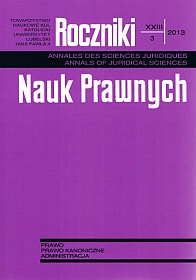Pars Absense in the Canonical Mariage Process. Analysis of Code of Canon Law and the Instruction Dignitas Connubii
Abstract
The absence of a party to a case is a frequent situation in a marriage nullity process. This applies to both the petitioning and the responding party, who, for various reasons, remain passive in relation to the pending process. The presented considerations aim to show norms and provisions of the Code of Canon Law of 1983 and Instruction Dignitas Connubii that regulate the conduct of a judge and the parties when either party fails to appear. Showing differences in judicial conduct and possible reasons for a party’s non-appearance is crucial for the understanding of the legal consequences for the parties and the course of the process. The following issues will have a significant impact on decisions made by a judge: reliance on the justice of the tribunal, refusal to receive a summons, hindering a petition from reaching the summoned party, or impossibility to determine the domicile of a party. The description of other possible reasons for absence of a party is followed by an enumeration of legal consequences in order to pinpoint the various steps that a judge can take as well as ways of providing protection for the parties.
References
Dzięga A., Strony sporu w kanonicznym procesie o nieważność małżeństwa, Warszawa 1994.
Greszata M., Charakterystyka udziału stron w kanonicznym sadowym postępowaniu spornym, „Roczniki Nauk Prawnych” 13(2003), z. 2, s. 101-125.
Greszata M., Kanoniczne procesy małżeńskie. Pomoc dla studentów, Lublin 2007.
Greszata-Telusiewicz M., Formalno-prawny oraz eklezjalny walor dyskusji sprawy w kanonicznym procesie o nieważność małżeństwa, [w:] Kościelne prawo procesowe, prawo rodzinne, Lublin 2010, s. 413-416. Materiały i Studia, t. V.
Kiwior W., Strony Procesowe, [w:] Komentarz do Instrukcji procesowej „Dignitas connubii”, Sandomierz 2007, s. 156-161.
Komentarz do Kodeksu Prawa Kanonicznego, red. J. Krukowski, t. V, Poznań Pallottinum 2007.
Madero L., Niestawiennictwo stron, [w:] Kodeks Prawa Kanonicznego. Komentarz, red. P. Majer, Kraków 2011, s. 1194-1198.
Majer P., Niestawiennictwo strony pozwanej w procesie o stwierdzenie nieważności małżeństwa, „Ius Matrimoniale” 7(2002), s. 165-187.
Miziński A. G., Ochrona praw oskarżonego w Kościele, w szczególności w kanonicznym procesie karno-sadowym, „Roczniki Nauk Prawnych” 17(2007), nr 1, s. 141-165.
Miziński A., Prawo wiernych do obrony w procesie kanonicznym, „Teka Komisji Prawniczej” 2009, s. 76-93.
Nowakowski B., Nowe regulacje procesowe w „Dignitas connubii” - wybrane zagadnienia, „Seminare” 28 (2010), s. 55-64.
Pawluk T., Prawo Kanoniczne wg Kodeksu Jana Pawła II, t. IV, Olsztyn 2009.
Pieronek T., Ochrona praw osoby ludzkiej w kanonicznym prawie procesowym, „Analecta Cracoviensia” 20(1998), s. 241-263.
Sobczak A., Stwierdzenie nieważności małżeństwa i inne małżeńskie procesy kościelne, Poznań 2010.
Stawniak H., Prawo do obrony w procesie kanonicznym, „Prawo Kanoniczne” 33(1990), nr 1-2, s. 141-152.
Stawniak H., Wprowadzenie sprawy, [w:] Instrukcja procesowa „Dignitas connubii”, Sandomierz 2007, s. 179-214.
Sztafrowski E., Podręcznik prawa kanonicznego, t. IV, Warszawa 1986.
Sztychmiler R., Kanoniczny proces o orzeczenie nieważności małżeństwa, „Ateneum Kapłańskie, 148 (2007), z. 1 (587), s. 38-52.
Sztychmiler R., Prawa stron w procesie kanonicznym, [w:] Nauki prawne wobec przemian, red. R. Sztychmiler, Olsztyn 2000.
Sztychmiler R., Proces sporny, [w:] Komentarz do Kodeksu Prawa Kanonicznego, t. V, red. J. Krukowski, Poznań: Pallottinum 2007.
Sztychmiler R., Sadownictwo kościelne w służbie praw człowieka, Olsztyn 2000.
Sztychmiler R., Wezwanie sadowe, „Prawo Kanoniczne” 44 (2001), nr 1-2, s. 125-139.
Sztychmiler R., Zawiązanie sporu w procesie kanonicznym, „Ius Matri- moniale” 6 (2001), s. 102.
Copyright (c) 2013 Roczniki Nauk Prawnych

This work is licensed under a Creative Commons Attribution-NonCommercial-NoDerivatives 4.0 International License.


